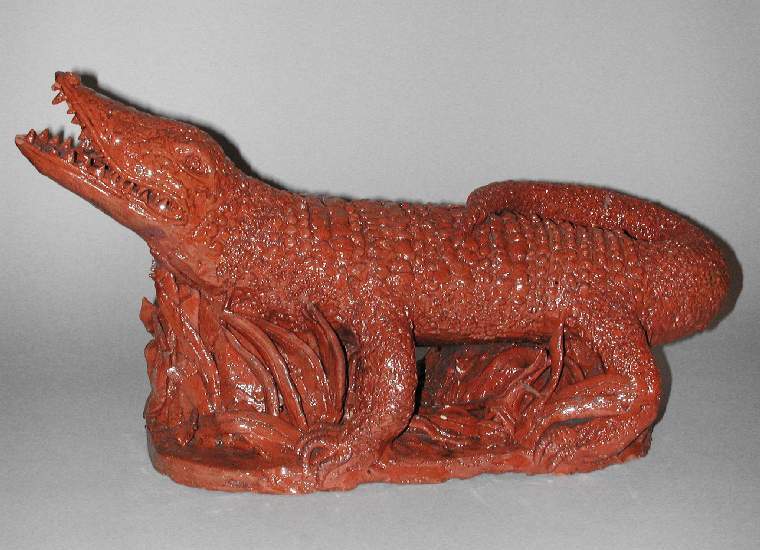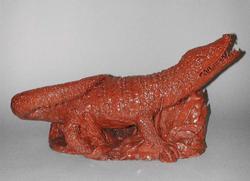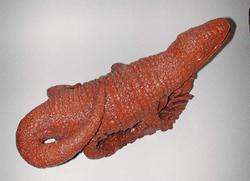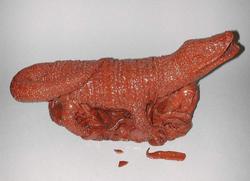Current Location: In storage
Titles
Crocodile
Maker(s)
Potter:
Bingham, Edward
Pottery:
Castle Hedingham Pottery
Entities
Categories
Description
Red earthenware covered with brown or clear glaze.
Large, modelled figure of a crocodile, its head raised and its tail curled over its back, standing among rushes on an oval base. The animal is covered with applied and incised ‘skin’ and the interior of its open mouth and its teeth realistically modelled. The rushes are suggested by flat strips of clay, which support the body. The base is flat; the underside is flat, rough and unglazed.
Notes
History note: Castle Hedingham Pottery. Bought there (from Mr Smith) on July 5 1907 for £1.10, by Dr Glaisher, Trinity College, Cambridge. According to Dr Glaisher’s notes, Mr Smith ‘of the Post Office’ was ‘in charge of the works’ after the pottery’s closure.
Legal notes
Dr. J.W.L. Glaisher Bequest, 1928
Measurements and weight
Length: 53.2 cm
Length: 21 in
Acquisition and important dates
Method of acquisition: Bequeathed
(1928)
by
Glaisher, J. W. L., Dr
Dating
Victorian
Circa
1875
CE
-
Circa
1905
CE
Note
Dr. Glaisher bought the crocodile, and some twenty other pieces, on two visits to the closed pottery, and one to a London showroom, in July 1907. He describes it as ‘a striking piece and well modelled and different in character from most of Bingham’s work’. He had earlier bought several pieces, including an Essex jug in the Fitzwilliam collection (C.99-1928), from the potter himself in 1896. He notes the best of Bingham’s work as ‘ambitious and characteristic work as regards the design modelling’ and ‘really fine and would do justice to any potter’, but he also records several examples of glazing failures.
Edward Bingham (1829- 1914) was the son of a Lambeth potter who mainly produced functional wares. The business moved first to Gestingthorpe, Essex, and then in 1837 to Castle Hedingham. From c.1864 Edward Bingham produced ornamental ware, drawing on mediaeval and Tudor styles and notable for its size and exuberant relief decoration, which often includes modeled animals, birds or faces. He used the local terracotta and, later, clay from Devon. Until the mid 1870s, most Hedingham ware was unglazed, and Bingham supplemented income through various other work, variously as a shoe-maker, teacher, sub-postmaster and ironmonger. The pottery was most successful between c.1875-85, with up to 13 kilns operating, but afterwards trade flagged and in 1901 the business was sold, though it continued to operate as ‘The Essex Art Pottery’ until 1905. Bingham continued to make pots there, and then for a few months in a temporary workshop, before emigrating to join his family in North America in 1906.
Components of the work
Decoration
composed of
glaze
( clear/yellow or brown)
Materials used in production
Red earthenware
Techniques used in production
Modelling
: Red earthenware, modelled and glazed
References and bibliographic entries
Identification numbers
Accession number: C.98-1928
Primary reference Number: 76489
Old object number: 2707
Stable URI
Audit data
Created: Saturday 6 August 2011
Updated: Wednesday 15 July 2020
Last processed: Tuesday 15 July 2025
Associated departments & institutions
Owner or interested party:
The Fitzwilliam Museum
Associated department:
Applied Arts







